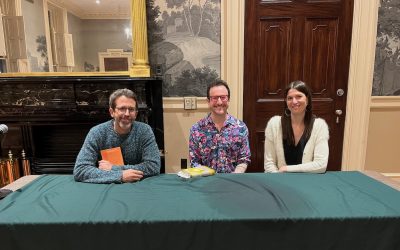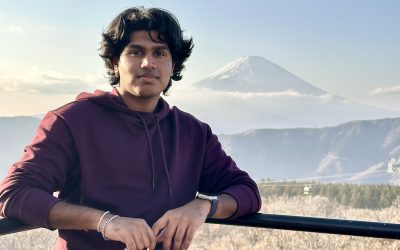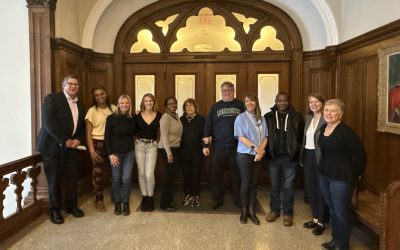Author of “The Girls” and “Daddy” answers Drew University student questions
February 2021 – International bestselling author Emma Cline joined the Drew University community for a virtual Writers@Drew event to discuss her work.
Cline began the evening answering questions about her writing process from Courtney Zoffness, assistant professor of English and director of Drew’s creative writing program.
She then read an excerpt from “White Noise,” a short story published in The New Yorker, written from the standpoint of convicted sex offender and former movie producer Harvey Weinstein.
“I try to avoid things that are too familiar or that are already pre-digested by the culture,” said Cline, discussing the process of entering the mind of a well-known and maligned figure.
“Maybe I should have found [his vantage point] more upsetting, but to me that’s what’s so great about writing and so weird and magical—the idea that you can drop into a consciousness that’s not yours, and is an a**hole and doesn’t operate based on societal norms,” she added.
“There’s something primitive and raw about it and for me it’s very fun. It’s often what I’m drawn to as a reader: the character that goes to toxic places in their minds.”
Following her reading, Cline answered questions from the students in the virtual audience.
Should someone be embarrassed to portray mental illness in nonfiction?
“No, I don’t think anyone should be. Personally, I prefer fiction because it’s ambiguous and doesn’t need a person behind it in the same way [as nonfiction]. I like that you can go anywhere with it. I think it’s always interesting to have an experience happen and think, ‘Will I write about this in a personal essay or let it bubble up in some way in fiction?’ And sometimes you do write a personal essay about it and that’s the right thing or it feels good.”
How do you choose which point of view to write from in fiction?
“I’ve been going to a close third person because, tonally, it feels like it’s easier to do what I want to do, which is that minute, granular shift in thinking, but also get to lay out the land in a broader way.”
“I think finishing things is so key. It’s almost 90 percent of the whole game. There are so many reasons not to write and not to finish something."
Did you get anxious the first time you had someone read your writing?
“That’s what’s so interesting about art making. Part of it is you want to be seen, and that’s why you’re writing: the impulse to have someone look at your darkest self or subconscious self and see it. But then it’s also so anxiety provoking, that tension between being seen and not wanting to be seen.
“Having a low-stakes reader who can read [my work] and not give me criticism, yet talk to me as if the story is a real thing and the people in it are real, that somehow gives me enough of a boost to keep going. You want someone else just to acknowledge that it’s a project and that it exists.”
Do you have any advice to build writing confidence?
“It’s almost like trying to learn how to shut off that part of your brain that’s really critical, because it’s so strong. I feel that every time I try to write. I don’t think it goes away. I think it’s just being like, okay, I’m going to write something and it’s going to be embarrassing, it’s not going to be good, it’s not going to come out preformed. I just need to put that part of my brain to sleep for a bit while I barf out this quite-embarrassing draft.
“I think finishing things is so key. It’s almost 90 percent of the whole game. There are so many reasons not to write and not to finish something. But finishing something—great, you can edit it, people will help you, it will only get better.”
What advice do you have for aspiring writers to see more deeply and “gather” their observations?
“For me it’s just following whatever your weird interests are. Especially as a young writer, it’s easy to think, ‘These are the books I should read, this is the kind of writing I should do, these are the types of stories I see getting published so I should write something like that,’ instead of being like, ‘What’s the weird gestalt of my particular, freaky brain, with all the weird inputs that are particular to me alone?’
“Trust that there’s some innate intelligence going on in your brain that’s going to put these things together. Trust yourself and give yourself the space to allow that to bubble up.”
All Writers@Drew events are co-sponsored by The Casement Fund and the English Department and are always free.



